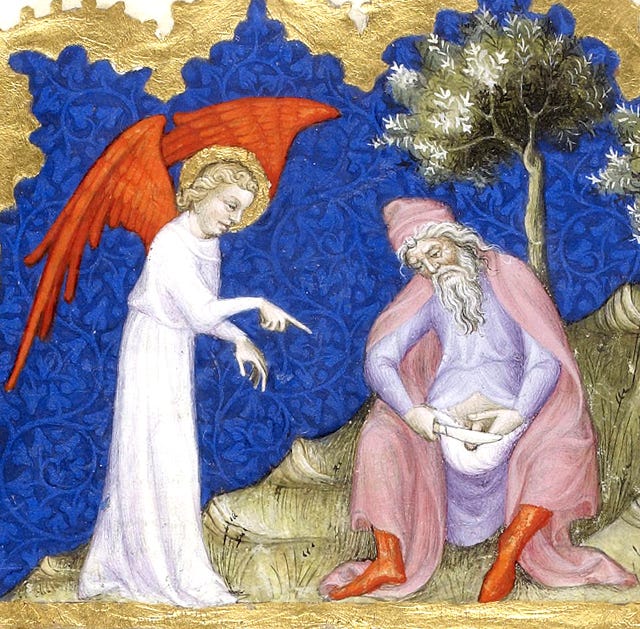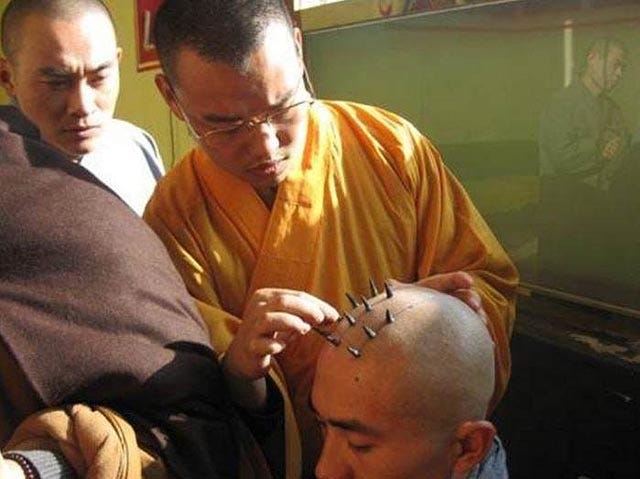Genesis 17 - We have to do WHAT?!
Total commitment
In Chapter 17 of Genesis, we reach the culmination of the "deal" the god has been making regarding the Covenant. It has all been leading to what some might consider a horrifying conclusion. In addition to the ancient couple of Mr. and Mrs. Abram changing their names, the god will also require that Abram, his 13-year-old son Ishmael, and all the males of his house, including his slaves, cut the ends off of their penises. Let's hear all the bloody details.
The Story
After thirteen years of radio silence, the god appears again to 99-year-old Abram and says, if you'll be perfect, I'll fulfill my promise. He changes Abram's name to the by-now-more-familiar Abraham, and (a little later) his wife Sarai's name to Sarah. (I have never met a Sarai.) The deal is the same--you'll be a great nation, I'll give you The Land, etc.--with one little catch to be announced in a moment.

Abraham circumcises his own penis - Circumcision of Abraham, from the Bible of Jean de Sy, ca. 1355-1357 (Wikipedia)
And that catch is: Abram--uh, Abraham--the men of his family, and all his male slaves, are to be circumcised. Now, the New International Version says just that one word--"you are to undergo circumcision"--but the KJV and others tell it like it is: "ye shall circumcise the flesh of your foreskin." Yikes! (And yes, he seems to have done it to himself. Double yikes!)
And being slaves, it's not like the men working for Abraham can just scan the want ads for a new job (though I'll wager more than a few ran away). "Wait, the boss has a new religion, and now he wants us to What?!" Just to make it clear, the god repeats himself, using some form of the word "circumcise" six times in five verses.
Then the god startles everyone by announcing that Sar... ah is going to get pregnant--at 89. And oddly, after expressing his astonishment, Abraham's first response is to start negotiating for Ishmael to hang on to some glory. (In the next chapter, we'll see that Abraham is quite a negotiator--and, later, that his hopes for Ishmael are not quite fulfilled.) Anyway, the god promises that Ishmael, too, will be "a great nation" and "be the father of twelve princes." But it is Isaac--the expected baby, who was named for his parents' laughter at the very thought--who will inherit the main Covenant.
And then all the men had their penis-tips cut off, all on the same day. (This would have been a great time for an enemy raid.) Abraham was 99 years old, Ishmael 13, and all the rest, I suspect, wishing they had never been born.
The Name Change

Title card from the TV series (Wikipedia)
I used to enjoy watching a British comedy series called To the Manor Born. Richard de Vere (born Bedrich Polouvicka) was a self-made grocery magnate who bought an estate, and the humor lay in seeing how the nouveau riche know-it-all was continually bested by the yokels (and the former lady of the manor). In one exchange, de Vere ran into Ned, the "outside man" (groundskeeper).
de Vere: Afternoon. Ned, isn't it?
Ned: That's right, sir. Been Ned as long as I can remember. First it were Young Ned. Then it were just Ned. Now it's Old Ned.
Why this stuck in my head I'll never know. But it serves as a reminder that when new circumstances develop, names may change. (I was first Jimmy, then Jim, now James. You can sometimes tell how long someone has known me by which name they use!)
This is especially true in religious life. Many churches use "baptismal names" and/or "confirmation names." Professional religious (monks and nuns) take names at ordination or vows in many traditions, including Christian and Buddhist (hence Catholic nuns with names like "Sister Joseph"), and lay people do so in some other traditions, like Iskcon and related movements. (My wife was born "Eloisa" but is widely known as "Lila" for just that reason. It's a Sanskrit name.)
And so when Abram officially "joins the movement," he goes from Abram (perhaps "exalted father") to Abraham (maybe "father of a multitude," though etymologies are shaky for both names). Both names must have seemed a little ironic for a man who had only one child--and an illegitimate one, at that!
His wife, too, who will be "mother of nations," changes from Sarai ("princess, or possibly "contentious," which she sort of seems to have been) to Sarah. The idea that Sarai meant "princess" seems bizarre; after all, why get all those business cards reprinted for a name change with no difference in meaning?
Anyway, no longer shall I have to write "Abram (who was later Abraham)" and so on. It's smooth sailing from here on out--or at least until we get to Jacob, whose name is changed to Israel.
Scarification for Everyone!
As mentioned, circumcision is a Big Deal in this chapter. "Circumcise," by the way, means cut (-cise) around (circum). The practice, known as a bris or brit milah, continues in Judaism to this day; in the New Testament, Jews were referred to as "the circumcised."

A protest against non-therapeutic infant circumcision in connection with the annual meeting of the American Academy of Pediatrics at the Washington Convention Center (Wikipedia)
But Jews aren't the only ones who perform this most common of surgeries. Wikipedia says, "An estimated one-third of males worldwide are circumcised." It is done for a variety of reasons, some of them based on medical claims that have been increasingly challenged in recent years. When I was born, it was pretty much done to all little boys. Here in the Philippines, it's a standard "rite of passage" for young adolescent boys; kids who refuse it are often mocked by their peers.
But why do it as a religious ritual?

A Chinese monk gets his head branded (from a Chinese website)
Let's look at a controversial practice among some Chinese Buddhists called "incense marks," or "head branding." Apparently, there was a time when being a monastic in China brought such prestige that a lot of fakes worked the crowds of gullible donors. (It's happening in China again today.) So the Emperor declared that all new monks or nuns must not only shave their heads, but have pieces of incense placed on their bare scalps to leave scars. (I guess the benefits weren't great enough for anyone to be willing to fake that!) Banned in China for some time, it has returned with a vengeance: formerly, there may have been just three marks, in a row paralleling and just above the (former) hairline, or sometimes there were nine (three rows of three). But since the "restoration," the standard seems to be TWELVE! Likewise, laypeople who take the "Bodhisattva Vows" may have three (or more) marks placed on their arms. I have met a few people from Taiwan who bear these scars.
The essence of this is, essentially, "No turning back." Until 1971, Catholic bishops would lightly tap the cheek of the person being confirmed, a symbolic "beating" along the lines of a knight being tapped on the shoulder with a sword at his induction ceremony. But, it is said, this tap on the cheek is a baby-fied version of what happens in other traditions, where an initiate may have a tooth knocked out--or have the tip of his penis cut off.
Later we will read stories where people "place their hands under someone's thigh" to make an oath--likely a euphemism for touching the circumcised penis and swearing an oath on the Covenant. Yuck. This may also be an allusion to the covenantal promise of "seed." Double yuck.
--------
And now on with the Text and Footnotes.
The Text: The Covenant, One More Time (17:1-8)
17:1 When Abram was ninety nine years old, the LORD appeared to him and said, "I am the Almighty God; walk before me, and be perfect.
17:2 "Then I will make a covenant between us, and will greatly multiply your descendants."
17:3 And Abram fell on his face, and God said,
17:4 "As for me, here is my covenant: you shall be the father of many nations.
17:5 "Your name shall no longer be Abram, but Abraham, as I have made you the father of many nations.
17:6 "I will make you extremely fruitful, and I will make nations of you, and kings shall come from you.
17:7 "I will establish my covenant between me and you and your descendants for generations as an everlasting covenant, to be a God to you and to your descendants after you.
17:8 "I will give to you and to your descendants after you the land where you are [now] an immigrant, all the land of Canaan, as an everlasting possession; and I will be their God.
17:1 "the Almighty God": The Hebrew here is El Shaddai, which, among other things, is the name of "the biggest Catholic charismatic movement in the Philippines." Its etymology, though, is rather touching; shad in Hebrew means "breast," so the god identifies himself here ae "the breasted god"; as Dr. Scofield glosses it, "the Nourisher, the Strength-giver, and so, in a secondary sense, the Satisfier, who pours himself into believing lives." Scofield also laments, "It is on every account to be regretted that 'Shaddai' was translated 'Almighty.'"
17:1 "be perfect": A tall order, that. There is some question as to whether the god said "You are perfect" or "You need to become perfect." I go for the latter, as Abraham's behavior so far doesn't even meet my relatively low standards.
17:3 Abram fell on his face: Some wags have reacted as though Abraham tripped or something, and "the breasted god's" entire response was to keep talking.
17:4 "here is my covenant": I guess the best teachers repeat themselves until their students get it.
17:5 For the name change, see the Mini-Sermon "The Name Change" above.
17:6-8 Nothing new here.
17:8 "immigrant": KJV stranger
The Text: Circumcision (17:9-14)
17:9 And God said to Abraham, "Therefore, you must keep my covenant, you and your descendants for generations.
17:10 "This is the covenant which you must keep, between me and you and your descendants: Every male child among you must be circumcised.
17:11 "You shall circumcise the flesh of your foreskin as a token of the covenant between me and you.
17:12 "At eight days old all males among you shall be circumcised, every man child--whether born in your house, or bought with money from a stranger, including those that are not your descendants.
17:13 "The ones born in your house, and the ones bought with your money, must be circumcised: and my covenant shall be in your flesh as an everlasting covenant.
17:14 "Any uncircumcised male child whose flesh of his foreskin is not circumcised shall be cut off from his people, for he has broken my covenant."
17:10 "Every male child among you must be circumcised": See the Mini-Sermon, "Scarification for Everyone!" above.
17:11 the flesh of your foreskin: Pastor Chuck Smith comments: "Circumcision was a symbol of the cutting away of the flesh to pursue the things of God and of His Spirit." Couldn't they just have gotten their ears pierced or something?
17:12 "At eight days old": Why eight days I cannot say for certain. Within Jewish tradition, many explanations have been advanced: it guarantees that the baby will have experienced at least one sabbath; later, the god says that animals should be sacrificed at eight days (but this seems circular); by eight days, the baby should be strong enough to bear up under this assault; the mother's "ritual impurity" lasted seven days; the baby's mourning over living in this world (and forgetting what he had been taught of Torah in the womb) is over; as seven represents the natural world (the days of creation, the planets, etc.), eight is the first "supranatural" number. From my own, universalist, perspective, eight is the number of corners on a cube, representing three-dimensional space, so it is the number of the world we live in. Welcome to the world, little one; now just let me...
17:12 "all males among you": If you weren't lucky enough to have been cut as an infant, your time has come. Oy!
17:13 "the ones bought with your money": i.e., slaves. Injury to insult.
17:14 whole verse: Either cut off your penis tip, or be cut off from the Covenant.
The Text: Isaac and Ishmael (17:15-22)
17:15 Then God said to Abraham, "As for Sarai your wife, you shall not call her Sarai, but her name shall be Sarah.
17:16 "I will bless her, and give you a son by her. I will bless her to be the mother of nations; kings of people shall be born of her."
17:17 Then Abraham fell upon his face, and laughed, and said in his heart, "Shall a child be born to one who is a hundred years old? And shall Sarah, at ninety years old, bear a child?"
17:18 And Abraham said to God, "If only Ishmael might live before you!"
17:19 And God said, "Your wife Sarah shall indeed bear you a son; and you shall call him Isaac. I will establish my everlasting covenant with him and his descendants.
17:20 "As for Ishmael, I have heard your prayer. I have blessed him, and will make him fruitful, and will greatly multiply his descendants. He shall be the father of twelve princes, and I will make a great nation of him.
17:21 "But I will establish my covenant with Isaac, whom Sarah shall bear to you at this time next year."
17:22 And God finished talking with Abraham, and went up from him.
17:15 For the name change, see the Mini-Sermon "The Name Change" above.
17:16 "I will... give you a son by her": Remember, Ishmael was born "of" Hagar, the Egyptian slave woman.
17:17 Then Abraham fell upon his face, and laughed: Down goes Abe again! But this time he's laughing. How could a 90-year-old woman give birth to a baby? Yet, as some have pointed out, with the extremely long lifespans of the patriarchs, that must not have been so unusual at some point? Anyway, this seems like a pretty big lapse of faith in a supposedly "perfect" guy.
17:17 said in his heart: Note that he didn't dare say it out loud, but the god is no dummy, and must have known why Abe was ROFL.
17:18 "If only Ishmael might live before you!": I find this extremely touching. The guy has just been told that he will have a legit son to take over the whole enterprise, and, after he gets over his derision, his first thought is for his bastard son. If Gloucester had treated Edmund better, he might not have tried to bring down the house. As for the actual meaning of "live before you," I take it to mean "be important to you" or "be on your radar."
17:19 "Your wife Sarah shall indeed bear you a son": See? He knew!
17:19 "Isaac": Hebrew "he laughs," sort of like the god having the last laugh on Abraham.
17:20 "As for Ishmael": The bastard son of a slave (why am I thinking of Hamilton?) will also become a great nation--the Arabs, and later, the Muslims, who, by the way, have enhanced his status greatly, making of him a prophet. Nevertheless, his days in the house of Abraham are numbered.
17:20 the father of twelve princes: Their names will be given in Chapter 25. This is a parallel to the Twelve Tribes of Israel, being descendants of the sons of Isaac's son Jacob (whose name was changed to Israel). Twelve is, of course, the number of months (usually the number of new moons) in a year. Later there will be twelve apostles, among many other "twelves" in the Bible.
17:21 "But I will establish my covenant with Isaac": Yeah, Ishmael gets a sop, a consolation prize, but Isaac is my boy.
17:21 "at this time next year": So, I guess she won't get pregnant for another three months yet.
17:22 God... went up from him: Where, exactly?
The Text: Every Male Goes under the Knife (17:23-27)
17:23 So Abraham took his son Ishmael, and all the males of his household, whether born in his house or bought with his money, and circumcised the flesh of their foreskin that very day, as God had instructed him.
17:24 Abraham was ninety-nine years old when he was circumcised in the flesh of his foreskin,
17:25 And Ishmael his son was thirteen years old, when he was circumcised in the flesh of his foreskin.
17:26 Abraham and his son Ishmael were circumcised on the same day,
17:27 And all the men of his house, whether born there or bought with money from strangers, were circumcised with him.
17:23ff Told in excruciating detail, all the male members (heh heh) of the household are circumcised on the same day. Stop saying "the flesh of his foreskin"! Gives me the willies.
17:25 And Ishmael his son was thirteen years old: How time flies!
--------
And that's about that. Next time, Abraham hosts three men, and negotiates with the god for the fate of Sodom and Gomorrah.
'Til soon!
